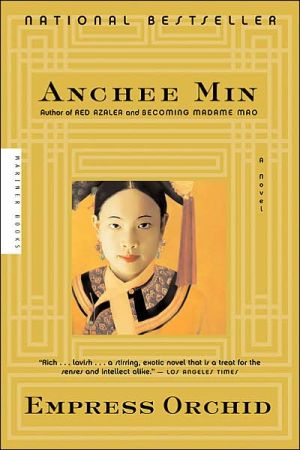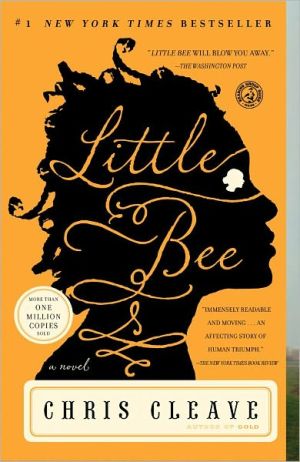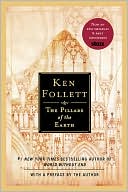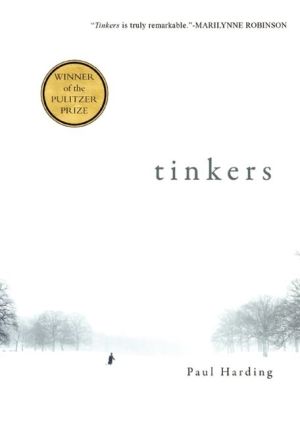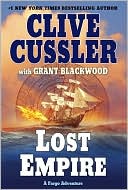Empress Orchid
From a master of the historical novel, Empress Orchid sweeps readers into the heart of the Forbidden City to tell the fascinating story of a young concubine who becomes China’s last empress. Min introduces the beautiful Tzu Hsi, known as Orchid, and weaves an epic of a country girl who seized power through seduction, murder, and endless intrigue. When China is threatened by enemies, she alone seems capable of holding the country together.\ In this “absorbing companion piece to her novel...
Search in google:
The setting is China's Forbidden City in the last days of its imperial glory, a vast complex of palaces and gardens run by thousands of eunuchs and encircled by a wall in the center of Peking. In this highly ordered place -- tradition-bound, ruled by strict etiquette, rife with political and erotic tension -- the Emperor, "the Son of Heaven," performs two duties: he must rule the court and conceive an heir. To achieve the latter, tradition provides a stupendous hierarchy of hundreds of wives and concubines. It is as a minor concubine that the beautiful Tzu Hsi, known as Orchid as a girl, enters the Forbidden City at the age of seventeen.It is not a good time to enter the city. The Ch'ing Dynasty in 1852 has lost its vitality, and the court has become an insular, xenophobic place. A few short decades earlier, China lost the Opium Wars, and it has done little since to strengthen its defenses or improve diplomatic ties. Instead, the inner circle has turned further inward, naively confident that its troubles are past and the glory of China will keep the "barbarians" -- the outsiders -- at bay.Within the walls of the Forbidden City the consequences of a misstep are deadly. As one of hundreds of women vying for the attention of the Emperor, Orchid soon discovers that she must take matters into her own hands. After training herself in the art of pleasing a man, she bribes her way into the royal bedchamber and seduces the monarch. A grand love affair ensues; the Emperor is a troubled man, but their love is passionate and genuine. Orchid has the great good fortune to bear him a son. Elevated to the rank of Empress, she still must struggle to maintain her position and the right to raise her own child. With the death of the Emperor comes a palace coup that ultimately thrusts Orchid into power, although only as regent until her son's maturity. Now she must rule China as its walls tumble around her, and she alone seems capable of holding the country together.This is an epic story firmly in the mold of Anchee Min’s Becoming Madame Mao. Like that best-selling historical novel, the heroine of Empress Orchid comes down to us with a diabolical reputation -- a woman who seized power through sexual seduction, murder, and endless intrigue. But reality tells a different story. Based on copious research, this is a vivid portrait of a flawed yet utterly compelling woman who survived in a male world, a woman whose main struggle was not to hold on to power but to her own humanity. Richly detailed and completely gripping, Empress Orchid is a novel of high drama and lyricism and the first volume of a trilogy about the life of one of the most important women in history.The New York TimesAn absorbing companion piece to her novel, Becoming Madame Mao (2000), Anchee Min's Empress Orchid is also based on the life of a powerful but frequently denigrated female leader. — John Hartl
One\ My imperial life began with a smell. A rotten smell that came from my father’s coffin—he had been dead for two months and we were still carrying him, trying to reach Peking, his birthplace, for burial. My mother was frustrated. “My husband was the governor of Wuhu,” she said to the footmen whom we had hired to bear the coffin. “Yes, madam,” the head footman answered humbly, “and we sincerely wish the governor a good journey home.” In my memory, my father was not a happy man. He had been repeatedly demoted because of his poor performance in the suppression of the Taiping peasant uprisings. Not until later did I learn that my father was not totally to blame. For years China had been dogged by famine and foreign aggression. Anyone who tried on my father’s shoes would understand that carrying out the Emperor’s order to restore peace in the countryside was impossible—peasants saw their lives as no better than death.\ I witnessed my father’s struggles and sufferings at a young age. I was born and raised in Anhwei, the poorest province in China. We didn’t live in poverty, but I was aware that my neighbors had eaten earthworms for dinner and had sold their children to pay off debts. My father’s slow journey to hell and my mother’s effort to fight it occupied my childhood. Like a long- armed cricket my mother tried to block a carriage from running over her family.\ The summer heat baked the path. The coffin was carried in a tilted position because the footmen were of different heights. Mother imagined how uncomfortable my father must be lying inside. We walked in silence and listened to the sound of our broken shoes tapping the dirt. Swarms of flies chased the coffin. Each time the footmen paused for a break the flies covered the lid like a blanket. Mother asked my sister Rong, my brother Kuei Hsiang and me to keep the flies away. But we were too exhausted to lift our arms. We had been traveling north along the Grand Canal on foot because we had no money to hire a boat. My feet were covered with blisters. The landscape on both sides of the path was bleak. The water in the canal was low and dirt- brown. Beyond it were barren hills, which extended mile after mile. There were fewer inns to be seen. The ones that we did come upon were infested with lice.\ “You’d better pay us,” the head footman said to Mother when he heard her complaint that her wallet was near empty, “or you will have to carry the coffin yourselves, madam.” Mother began to sob again and said that her husband didn’t deserve this. She gained no sympathy. The next dawn the footmen abandoned the coffin.\ Mother sat down on a rock by the road. She had a ring of sores sprouting around her mouth. Rong and Kuei Hsiang discussed burying our father where he was. I didn’t have the heart to leave him in a place without a tree in sight. Although I was not my father’s favorite at first —he was disappointed that I, his firstborn, was not a son—he did his best in raising me. It was he who insisted that I learn to read. I had no formal schooling, but I developed enough of a vocabulary to figure out the stories of the Ming and Ch’ing classics.\ At the age of five I thought that being born in the Year of the Sheep was bad luck. I told my father that my friends in the village said that my birth sign was an inauspicious one. It meant that I would be slaughtered.\ Father disagreed. “The sheep is a most adorable creature,” he said. “It is a symbol of modesty, harmony and devotion.” He explained that my birth sign was in fact strong. “You have a double ten in the numbers. You were born on the tenth day of the tenth moon, which fell on the twenty-ninth of November 1835. You can’t be luckier!” Also having doubts regarding my being a sheep, Mother brought in a local astrologer to consult. The astrologer believed that double ten was too strong. “Too full,” the old hag said, which meant “too easily spilled.” “Your daughter will grow up to be a stubborn sheep, which means a miserable end!” The astrologer talked excitedly as white spittle gathered at the corners of her mouth. “Even an emperor would avoid ten, in fear of its fullness!” Finally, at the suggestion of the astrologer, my parents gave me a name that promised I would “bend.” This was how I was called Orchid.\ Mother told me later that orchids had also been the favorite subject of my father’s ink paintings. He liked the fact that the plant stood green in all seasons and its flower was elegant in color, graceful in form and sweet in scent.\ My father’s name was Hui Cheng Yehonala. When I close my eyes, I can see my old man standing in a gray cotton gown. He was slender with Confucian features. It is hard to imagine from his gentle look that his Yehoonala ancestors were Manchu Bannermen who lived on horseback. Father told me that they were originally from the Nu Cheng people in the state of Manchuria, in northern China between Mongolia and Korea. The name Yehonala meant that our roots could be traced to the Yeho tribe of the Nala clan in the sixteenth century. My ancestors fought shoulder to shoulder with the Bannerman leader Nurhachi, who conquered China in 1644 and became the first Emperor of the Ch’ing Dynasty. The Ch’ing had now entered its seventh generation. My father inherited the title of Manchu Bannerman of the Blue Rank, although the title gave him little but honor.\ When I was ten years old my father became the taotai, or governor, of a small town called Wuhu, in Anhwei province. I have fond memories of that time, although many consider Wuhu a terrible place. During the summer months the temperature stayed above one hundred degrees, day and night. Other governors hired coolies to fan their children, but my parents couldn’t afford one. Each morning my sheet would be soaked with sweat. “You wet the bed!” my brother would tease.\ Nevertheless, I loved Wuhu as a child. The lake there was part of the great Yangtze River, which drove through China carving out gorges, shaggy crags, and valleys thick with ferns and grasses. It descended into a bright, broad, richly watered plain where vegetables, rice and mosquitoes all thrived. It flowed on until it met the East China Sea at Shanghai. Wuhu meant “the lake of a luxuriant growth of weeds.” Our house, the governor’s mansion, had a gray ceramic-tile roof with the figures of gods standing at the four corners of the tilted eaves. Every morning I would walk to the lake to wash my face and brush my hair. My reflection in the water was mirror-clear. We drank from and bathed in the river. I played with my siblings and neighbors on the slick backs of buffalo. We did fish-and-frog jumps. The long bushy weeds were our favorite hiding places. We snacked on the hearts of sweet water plants called chiao-pai.\ In the afternoon, when the heat became unbearable, I would organize the children to help cool the house. My sister and brother would fill buckets, and I would pull them up to the roof where I poured the water over the tiles. We would go back to the water afterward. P’ieh, bamboo rafts, floated by. They came down the river like a giant loose necklace. My friends and I would hop onto the rafts for rides. We joined the raft men singing songs. My favorite tune was “Wuhu Is a Wonderful Place.” At sunset Mother would call us home. Dinner was set on a table in the yard under a trellis covered with purple wisteria.\ My mother was raised the Chinese way, although she was a Manchu by blood. According to Mother, after the Manchus conquered China they discovered that the Chinese system of ruling was more benevolent and efficient, and they adopted it fully. The Manchu emperors learned to speak Mandarin. Emperor Tao Kuang ate with chopsticks. He was an admirer of Peking opera and he hired Chinese tutors to teach his children. The Manchus also adopted the Chinese way of dressing. The only thing that stayed Manchu was the hairstyle. The Emperor had a shaved forehead and a rope- like braid of black hair down his back called a queue. The Empress wore her hair with a thin black board fastened on top of her head displaying ornaments.\ My grandparents on my mother’s side were brought up in the Ch’an, or Zen, religion, a combination of Buddhism and Taoism. My mother was taught the Ch’an concept of happiness, which was to find satisfaction in small things. I was taught to appreciate the fresh air in the morning, the color of leaves turning red in autumn and the water’s smoothness when I soaked my hands in the basin.\ My mother didn’t consider herself educated, but she adored Li Po, a Tang Dynasty poet. Each time she read his poems she would discover new meanings. She would put down her book and gaze out the window. Her goose-egg-shaped face was stunningly beautiful.\ Mandarin Chinese was the language I spoke as a child. Once a month we had a tutor who came to teach us Manchu. I remember nothing about the classes but being bored. I wouldn’t have sat through the lessons if it hadn’t been to please my parents. Deep down I knew that my parents were not serious about having us master the Manchu language. It was only for the appearance, so my mother could say to her guests, “Oh, my children are taking Manchu.” The truth was that Manchu was not useful. It was like a dead river that nobody drank from.\ I was crazy about Peking operas. Again, it was my mother’s influence. She was such an enthusiast that she saved for the entire year so she could hire a local troupe for an in-house performance during the Chinese New Year. Each year the troupe presented a different opera.My mother invited all the neighbors and their children to join us. When I turned twelve the troupe performed Hua Mulan.\ I fell in love with the woman warrior, Hua Mulan. After the show I went to the back of our makeshift stage and emptied my wallet to tip the actress, who let me try on her costume. She even taught me the aria “Goodbye, My Dress.” For the rest of the month people as far as a mile from the lake could hear me singing “Goodbye, My Dress.” My father took pleasure in telling the background to the operas. He loved to show off his knowledge. He reminded us that we were Manchus, the ruling class of China. “It is the Manchus who appreciate and promote Chinese art and culture.” When liquor took hold of my father’s spirit, he would become more animated. He would line up the children and quiz us on the details of the ancient Bannerman system. He wouldn’t quit until every child knew how each Bannerman was identified by his rank, such as Bordered, Plain, White, Yellow, Red and Blue.\ One day my father brought out a scroll map of China. China was like the crown of a hat ringed by countries eager and accustomed to pledging their fealty to the Son of Heaven, the Emperor. Among the countries were Laos, Siam and Burma to the south; Nepal to the west; Korea, the Ryukyu Islands and Sulu to the east and southeast; Mongolia and Turkestan to the north and northwest.\ Years later, when I recalled the scene, I understood why my father showed us the map. The shape of China was soon to change. By the time my father met his fate, during the last few years of Emperor Tao Kuang, the peasant revolts had worsened. In the midst of a summer drought, my father didn’t come home for months. My mother worried about his safety, for she had heard news from a neighboring province about angry peasants setting their governor’s mansion on fire. My father had been living in his office and trying to control the rebels. One day an edict arrived. To everyone’s shock the Emperor dismissed him.\ Father came home deeply shamed. He shut himself in the study and refused visitors. Within a year his health broke down. It didn’t take him long to die. Our doctor bills piled up even after his death. My mother sold all of the family possessions, but we still couldn’t clear the debts. Yesterday Mother sold her last item: her wedding souvenir from my father, a butterfly hairpin made of green jade.\ Before leaving us, the footmen carried the coffin to the bank of the Grand Canal so we could see the passing boats, where we might get help. The heat worsened and the air grew still. The smell of decay from the coffin grew stronger. We spent the night under the open sky, tormented by the heat and mosquitoes. My siblings and I could hear one another’s stomachs rumbling.\ I woke at dawn and heard the clattering of a horse’s hooves in the distance. I thought I was dreaming. In no time a rider appeared in front of me. I felt dizzy with fatigue and hunger. The man dismounted and walked straight toward me. Without saying a word he presented me with a package tied with ribbon. He said it was from the taotai of the local town. Startled, I ran to my mother, who opened the package. Inside were three hundred taels of silver.\ “The taotai must be a friend of your father’s!” Mother cried. With the help of the rider we hired back our footmen. But our good luck didn’t last. A few miles down the canal we were stopped by a group of men on horses led by the taotai himself. “A mistake has been made,” he said. “My rider delivered the taels to the wrong family.” Hearing this, Mother fell to her knees.\ The taotai’s men took back the taels.\ Exhaustion suddenly overwhelmed me and I fell on my father’s coffin.\ The taotai walked to the coffin and squatted as if studying the grains of the wood. He was a stocky man with rough features. A moment later he turned to me. I expected him to speak but he didn’t.\ “You are not a Chinese, are you?” he finally asked. His eyes were on my unbound feet.\ “No, sir,” I replied. “I am Manchu.” “How old are you? Fifteen?” “Seventeen.” He nodded. His eyes continued to travel up and down, examining me.\ “The road is filled with bandits,” he said. “A pretty girl like you should not be walking.” “But my father needs to go home.” My tears ran.\ The taotai took my hand and placed the silver taels in my palm. “My respects to your father.” I never forgot about the taotai. After I became the Empress of China I sought him out. I made an exception to promote him. I made him a provincial governor, and he was given a handsome pension for the rest of his life.\ Copyright © 2004 by Anchee Min. Reprinted by permission of Houghton Mifflin Company.
\ The New York TimesAn absorbing companion piece to her novel, Becoming Madame Mao (2000), Anchee Min's Empress Orchid is also based on the life of a powerful but frequently denigrated female leader. — John Hartl\ \ \ \ \ The Washington PostShe's been written about before, this empress. In 1956 Pearl Buck gave us "Imperial Woman," a romanticized look at the woman who was "in youth a beautiful concubine, in middle life a brilliant strategist, in old age a goddess." The characters in Imperial Woman all talk Buck-speak, and why shouldn't they? ("Am I an infant that I play with toy animals?" The boy emperor expostulates at one point, "How dare you, Li Lien-Yang, defy your sovereign? I will have you sliced for this! Send me here my guardsmen!") But Anchee Min, raised in China, sent to the countryside during the revolution and writing here in English, takes a much less florid view. These are real people she writes about, and the crumbling of a world that -- though, God knows, strange to us -- was all too real to the people who lived in it. … Carolyn See\ \ \ Publishers WeeklyTalk about story arc: poor girl from rural China auditions for a job as royal concubine, winds up as emperor's wife number four, gives birth to the "last Emperor," rules China as regent for 46 years. The fascinating, implausible life of Tsu Hsi, or "Orchid," was reviled by the revolutionary Chinese, but here it receives a sympathetic treatment from Min (Red Azalea; Becoming Madame Mao), who once again brilliantly lifts the public mask of a celebrated woman to reveal a contradictory character. Sexually assertive, intellectually ambitious, socially striving, Min's Orchid is also "isolated, tense, and in some vague but very real way, dissatisfied." Even after giving birth to the emperor's only son, Orchid feels trapped by the stultifying imperial rituals and persecuted by the other residents of the Forbidden City: six other royal wives, 3,000 invisible concubines and 2,000 scheming eunuchs. In addition to these powerful distractions, she has to discipline her overindulged son, outmaneuver the ruthless politician Su Shun (who wants her buried alive when the emperor dies) and advise the ailing emperor how to fend off both the Boxers and the Western "barbarians." Min, herself a survivor of China's Cultural Revolution, has done a prodigious amount of on-site research to capture the glorious, hopeless last days of the Ching dynasty. At times her writing is textbook-flat, and she sometimes loses track of her teeming cast of characters (for example, Orchid's dangerous mother-in-law and mentally ill sister). But readers will be enthralled by the gorgeously woven cultural tapestry and the psychologically astute portrait of the empress a talented girl from the provinces who married (way) up. (Feb. 3) Forecast: Empress Orchid does for 19th-century China what Becoming Madame Mao did for the People's Republic and stands a good chance of matching the latter's success. If it does, readers will clamor for Min's promised sequel (the novel ends when Orchid comes to power) and the film prospects (rights have been optioned by Oliver Stone imagine Bertolucci's The Last Emperor with a conspiracy twist) will look even better. Fourteen-city author tour. Copyright 2004 Reed Business Information.\ \ \ \ \ Library JournalThe only thing wrong with this intriguing novel is the title-it should have been (and apparently was originally) called The Last Empress. In it, Min (Becoming Madame Mao) re-creates the life of the last empress of the Manchu dynasty, from her beginnings in a poor but honorable family to her becoming concubine to the emperor of China, to being designated his adviser and helpmate. Once chosen to be one of the emperor's seven main wives, Orchid, who takes the name Lady Yehonala, soon discovers that the supposedly privileged life inside Peking's Forbidden City is as fraught as her hardscrabble existence outside its walls. She must guard her prerogatives against the other wives and be wary of court intrigues that would discredit her. As she has shown before, Min has a talent for entering into the character of notorious Chinese women and presenting their lives in a sympathetic but judicious light. This imaginative work should be welcome in all public libraries with a taste for history and the exotic. [Previewed in Prepub Alert, LJ 10/15/03.]-Edward Cone, New York Copyright 2003 Reed Business Information.\ \ \ \ \ Kirkus ReviewsChinese-born Min's usual meticulous attention to local color (Wild Ginger, 2002, etc.) puts a brake on what should be a riveting tale-the ascent to power of China's last Empress-in a court where beheadings are as frequent as concubines are numerous. Min has done her research, and, unfortunately, it shows. The many and vivid details of court life-custom, costume and culture of late 1800s China-undercut her efforts to give a more balanced portrait of a woman who has often been vilified for her role in the decline of Chinese power. Narrated by the Empress, called Orchid because of her beauty, the story begins as Orchid, a member of an aristocratic clan related to the ruling Manchus, accompanies her family to Beijing to bury her recently deceased father. As the family faces poverty and starvation in Beijing, the 17-year-old Orchid learns of an Imperial decree announcing that the young Emperor Hsien Feng is looking for future mates who, to preserve the purity of the Imperial blood, must be Manchu. Miraculously, Orchid is chosen. Her family receives money, and she receives valuable gifts, lives in splendor in the Forbidden City, and has countless servants. But the life is stifling-protocol is all, jealousy commonplace, few can be trusted-and Orchid realizes that the only way to obtain a more secure life is to bed the Emperor and bear him an heir. Which, with some scheming, she manages to do, but China in the early 1860s is beset with problems. The European powers are seizing the country's territory, selling opium, and insisting on reparations from the Emperor. Meantime, the Imperial court is divided, the Emperor is weak both in judgment and health, and Orchid fears her son may not succeed hisfather. When the Emperor does die, her five-year-old son, although he's named heir, is too young to rule, and Orchid must ensure that both of them stay alive as rivals plot and treachery is everywhere. Evocative, but underpowered in simple narrative. Film rights to Oliver Stone; author tour. Agent: Sandra Dijkstra/Sandra Dijkstra Literary Agency\ \
